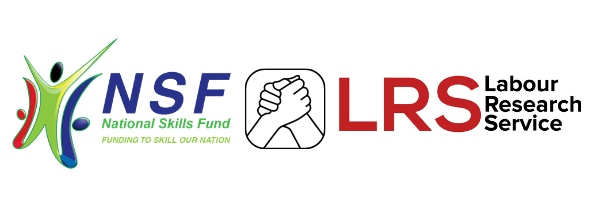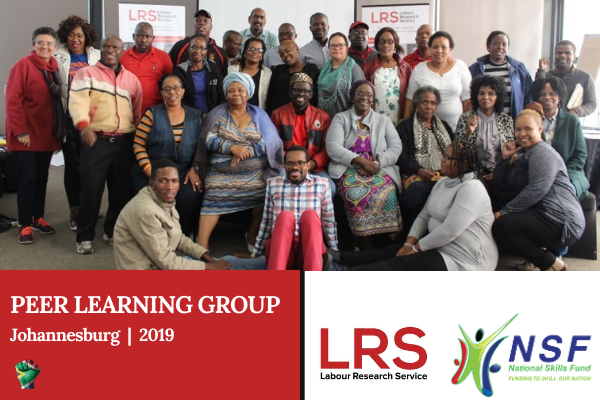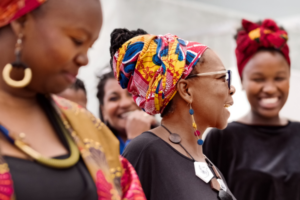From 21 to 24 May 2019, the Labour Research Service (LRS) hosted the first peer learning workshop in our broader project seeking to address information and skills asymmetries in collective bargaining in South Africa.
Supported by the National Skills Fund, the LRS will work with worker representatives to develop strategies for responding to issues in the changing workplace. The work will culminate in the publishing of a new guide for union negotiators. The Negotiators Guide will offer strategies for organising and negotiating for workers in the changing workplace and evolving collectives.
Snapshot profile of workshop participants
The worker leaders have between one to ten years of experience in their respective organisations. They are negotiators at the plant/company, provincial and national levels.
The worker leaders came from both the formal and informal sectors. They are members of the following organisations: South African Transport Workers Union (SATAWU); South African Catering Commercial Allied Workers Union (SACCAWU); South African Democratic Teachers’ Union (SADTU); Health and Other Services Personnel of South Africa (HOSPERSA); South African Domestic Services and Allied Workers Union (SADSAWU); United Domestic Workers of South Africa (UDWOSA); South African Municipal Workers’ Union (SAMWU); African Reclaimers Organisation (ARO); Migrants Workers’ Union of South Africa (MIWUSA); and Johannesburg Informal Traders Platform (JITP).
During the workshop, the participants began the process of creating a model Inclusive Collective Bargaining Agreement (ICBA). We envisioned an ICBA that will respond to the needs of all workers in the changing workplace.
Workshop participants sought to address the following questions:
1) Where do I find myself in relation to a more inclusive collective agreement?
2) What are the existing gaps?
3) What are the priority issues?
4) What do we need to do to meet these priorities?
Defining a model Inclusive Collective Bargaining Agreement (ICBA)
An inclusive collective bargaining agreement takes into account the changing workplace and the need for changing collectives to respond to workplace changes. It is shaped by the needs of all workers, taking into account the specific needs and conditions of, for example, women, young and old workers, LGBTI workers, migrant workers and workers living with a disability. The inclusive collective bargaining agreement is a visionary goal to be strived for.
LRS expectations of the process
The peer learning process will feed into the development of the LRS Negotiators’ Guide. We expect the following from the peer learning:
- Worker leaders who feel more confident to include the needs of workers who have not been traditionally included in the collective bargaining agenda
- Worker leaders who feel more confident in identifying and including issues relevant to the changing nature of work into the collective bargaining agenda
- Examples of issues relevant to present-day collective bargaining scenarios that are informing future scenarios for collective bargaining and that can be used in a new LRS Trade Union Manual for Negotiators.
Sharing our stories: Expectations of the participants
The workshop participants said they felt most excited about sharing knowledge, experiences and friendship. They also felt excited about bringing enthusiasm and laughter into the workshop space.
The worker leaders got formed groups and mapped out a day in the life of a worker in their sectors. Group A comprised of healthcare workers, care workers, waste pickers and live-in domestic workers. Group B comprised of teachers, commuting domestic workers, informal traders and contract cleaners. Petrol attendants, security workers, vulnerable hospitality sector workers and formally employed hospitality sector workers formed Group C. The exercise of creating personas for each sector surfaced some of the similar and persistent issues faced by all workers, as well as the sector-specific issues.
Collective Bargaining Agreements – our experience
What is a collective agreement?
The Labour Relations Act under section 213 defines a collective agreement as follows: A collective agreement means a written agreement concerning terms and conditions of employment or any other matter of mutual interest concluded by one or more registered trade unions on the one hand and the other hand: One or more employers, one or more registered employers’ organisations, or one or more employers and one or more registered employers’ organisation.
Participating worker leaders explored the various categories of agreements such as Sectoral Determinations, Private Sector Bargaining Councils, Public Sector Bargaining Councils and Plant/Institutional Level. They discussed what it means for them to bargain in these platforms and their experiences of being covered by a specific kind of agreement.
Sharing our stories: What does a decent collective bargaining agreement look like?
Collective bargaining allows workers’ voices to be heard and improves their working conditions. In South Africa, collective bargaining has tried to balance the unequal relations between employers and workers in full-time employment especially. But the prevalence of other forms of employment in the country means not everyone has achieved decent work. These forms of employment include temporary, part-time and other contractual arrangements involving multiple parties such as labour brokers.
The participants identified some key issues that workers in their sectors are most passionate about and which should be included in any decent agreement, as follows: Above inflation salary increase; Paid overtime; Night shift allowance; Annual bonus; Paid study leave; Provident fund; Medical aid; Compensation for workplace injuries and deaths; Guaranteed maternity leave; Family responsibility leave; Provisions for childcare when working overtime or working away from home; Decent working hours; Safe working conditions ; Specific and enforceable collective agreement; An agreement that enforces all labour laws and is binding to all parties.
Starting the conversation: Towards creating a model Inclusive Collective Bargaining Agreement (ICBA)
So, what’s missing in the existing agreements and what are the strategies for getting the priorities in agreements? The worker leaders identified the following priorities to strengthen their collective bargaining agreements.
Migrant Domestic Workers (live-in)
What are the priorities for live-in migrant domestic workers?
1. Annual bus ticket
2. Quick implementation of agreements and enforcement of labour laws, including the National Minimum Wage Act
3. Union access to employer’s property
4. Dealing with violence and discrimination at work
Strategy for getting the priorities: The union will empower members to bargain by themselves and offer further support such as writing official communication.
Domestic Workers (live-in)
What are the priorities for live-in domestic workers?
1. A written contract of employment
2. Pension or provident fund
3. Complaint mechanism to report inefficient labour inspectors
4. Housing for retired domestic workers
Community Health Workers (care workers)
What are the priorities care workers?
1. Absorption of Community Health Workers into the Public Service Sector
2. Extension of the (1 year) resolution, which ended in June 2019
3. Occupational health and safety standard
4. Skills development and training
Contract Cleaning Workers
What are the priorities for contract cleaning workers?
1. Completing the process of establishing a bargaining council for the contract cleaning sector
2. Early reporting and late knock-off times
3. Increase compassionate leave to more than the stipulated (3) days.
4. Medical aid and housing allowance
5. Addressing workers’ concerns about the pros and cons of bargaining at a national level platform through the proposed contract cleaning bargaining council
Strategies for getting the priorities: Union membership recruitment drive to achieve the required numbers for setting up the bargaining council.
Wholesale and retail workers
What are the priorities for the wholesale and retail workers?
1. Night shift allowances, compensation calculations and conditions of service
2. Family responsibility of at least 12 days
3. Study leave and loans
4. Maternity leave of 12 months, of which 8 months should be paid by an employer and 4 months by the government
5. Wages – minimum entry level of R5000p/m
6. Family responsibility leave – the challenge of providing proof to an employer
Retail sector – Part-time workers
What are the priorities for part-time retail workers?
1. Compulsory medical aid
2. Safe and reliable transport for early and night shift workers
Strategies for getting the priorities: Recruiting and organizing drive by the trade union.
Informal traders
What are the priorities for workers in the informal sector?
1. Provision of storage facilities – Failure of City to implement the agreement with traders
2. Childcare facilities/ daycare centre
Waste pickers and recyclers
What are the priority issues for reclaimers?
1. Safety for female waste pickers – that work very early
2. Licensing of all cooperatives and ensuring that members enjoy benefits
3. Information on the recycling sectors, specifically the number of operators and volumes of collected waste
4. Access to membership cards
5. Recognition of association in regional and local levels
6. Popularize membership requirements
7. Ablution facilities
8. Storage facilities
9. Access to secured properties
Petrol Attendants
What are the priority issues for petrol attendants?
1. Transport to work on time
2. A living wage (including a 13th cheque)
3. Night shift allowances
4. Casuals to receive the same benefits and conditions as full-time workers
Security Workers
What are the priority issues for security workers?
1. Implementation and popularising the bargaining council for the security sector
2. Wages – 13th cheque
3. Night shift allowance
4. Shorter working hours
5. Transport
6. Revamped working stations
Teaching Sector
1. Enforcing and popularising of the new collective agreement number 3 of 2018, on compulsory enquiry by arbitration in relation to sexual misconduct by teachers on learners
The questions and comments made by participants after each sector presented its priority issues will shape the different issues that could form a model Inclusive Collective Bargaining Agreement (ICBA).
The next peer learning workshop will be in Johannesburg from 20 to 23 August 2019.
View workshop photographs on our Facebook page here and here.








